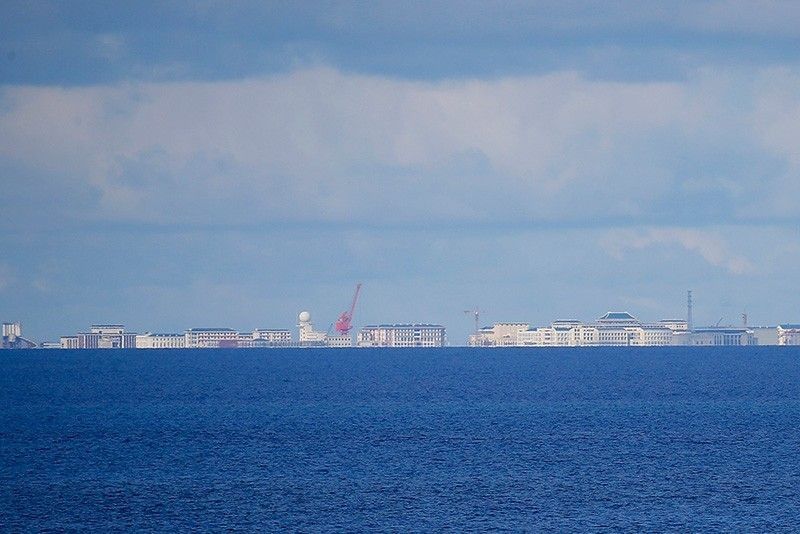Does the Philippines have limited options on the South China Sea issue?

MANILA, Philippines — President Rodrigo Duterte keeps on insisting that taking a stronger stance on against China's militarization in the South China Sea would mean going to war.
Justifying his administration's soft stance on the maritime dispute, Duterte said that he would have taken a stronger and more "violent" position on the matter but that would "probably be a great loss to the nation and probably end up losing a war."
As opposed to the president's pronouncements, the Philippines' options are not limited to waging a war to resolve the dispute.
READ: Duterte explains soft stance on West Philippine Sea dispute: We can't win
The Philippines actually has legal, diplomatic and security policy options following the July 2016 ruling of a United Nations-backed tribunal on the Sout China Sea, according to an April 2017 report titled "South China Sea Lawfare: Post-Arbitration Policy Options and Future Prospects."
Legal policy options
Jay Batongbacal, director of the University of the Philippines Institute for Maritime Affairs and Law of the Sea, said that the use of armed force in settling the disputes is out of the question.
Following the issuance of the arbitral ruling, the Philippines has legal policy options related to the entrenchment of legal positions on entitlements, rights and delimitation, re-engagement with China on legal positions and engagement with other claimants and the ASEAN on the same basis.
"Therefore, its only policy framework for addressing and eventually resolving the South China Sea disputes must be based on the peaceful modes of dispute settlement enumerated in the Charter of the United Nations and Part XV of UNCLOS," Batongbacal said in his article in the report.
Batongbacal also opened the possibility of China changing its position on the arbitral ruling under the circumstances of "a transactional exchange of legal rights for economic benefits or an accommodation coerced through unilateral actions."
Re-engaging with China on the basis of legal positions would give the Philippines two tracks — re-engaging and improving bilateral ties and the possibility of another round of unilateral actions and escalating the sea row.
"These options present the best suitable means for the Philippines to protect and preserve its exclusive rights and interests in its EEZ and continental shelf, while at the same time, leaving the doors open to possible joint cooperation related to shared interests in the remaining disputed areas comprised of 12-nautical mile territorial sea enclaves around all the high-tide elevations in the Spratly Islands area," Batongbacal said.
Engaging with other claimant states such as Vietnam, Malaysia and Brunei would result to a clear and common position derived from the arbitral decision, despite China's refusal to acknowledge the landmark ruling.
As such, the award could be a basis for a unified regional position on maritime rights and jurisdiction in the South China Sea among Southeast Asian countries, Batongbacal said.
"In summary, the Award has provided the Philippines with very strong legal leverage that can be used in its bilateral relations and discussions with China and in multilateral relations with other parties both within and beyond the region," the maritime law expert said.
So far, the Philippines has started a bilateral consultation mechanism with China on the South China Sea while negotiations on a legally binding code of conduct are ongoing with the ASEAN.
RELATED: Expert: Malaysia, Vietnam also potential partners in sea exploration
Diplomatic policy options
The Duterte administration departed from the Aquino administration's confrontational strategy when it opted to set aside the arbitral ruling and chose to directly engage with China instead.
Policy analyst Richard Heydarian suggested that the primary diplomatic option would be to engage with China rather than confront it.
"Instead of leading to further confrontation between the (Philippines) and (China), the conclusion of the arbitral proceedings has actually enhanced their resolve to bridge their differences through diplomacy, leading to a decline in tensions in the South China Sea," Heydarian said in the "South China Sea Lawfare" report.
He suggested that a joint fisheries agreement in the Scarborough Shoal, which Beijing continues to control, would be a "game-changing" compromise.
Given that the Duterte administration prefers avoiding conflict, a mutually satisfactory agreement would move closer to the renormalization of ties between the two countries, according to Heydarian.
"Much of this has to do with the Duterte administration’s pragmatic foreign policy outlook and the realization that translating de jure victory into de facto gains requires careful and deliberate diplomacy," he said.
US-based think tank Council on Foreign Relations (CFR), meanwhile, suggests that a mediation from ASEAN or a neutral party such as Singapore, would be possible in case of conflict in the area.
"Parties could also call for an emergency session of the UN Security Council to negotiate a cease-fire, although China’s permanent seat on the Council could limit the effectiveness of this option," the think tank said.
RELATED: Vietnam asks China to withdraw missiles from South China Sea
Security policy options
Rommel Banlaoi, chairman of the Philippine Institute for Peace, Violence and Terrorism Research, said that the South China Sea dispute is not only a legal issue but also a security issue which requires security responses.
"Aware of the aforementioned security implications and the current security situation in the post-arbitration South China Sea, the Philippine government is now pursuing several key policy options, including rethinking its security alliance with the US, strengthening its strategic partnerships with Japan and Australia, promoting strategic cooperation with ASEAN members, and engaging China constructively in functional areas and on non-traditional security issues," Banlaoi said.
While the arbitral award gave the Philippines legal victory, the ruling also had security implications such as the protection of Filipino fishermen in Scarborough Shoal, securing the country's gas and oil exploration projects in Reed Bank and ensuring the safety of Filipino troops in the Kalayaan Island Group.
Think tank CFR also suggested that military-to-military communication would reduce the escalation of conflict over the South China Sea.
"Communication mechanisms like military hotlines to manage maritime emergencies, similar to the ones set up by China and Japan, China and Vietnam, and China and ASEAN, could be established among all claimants," the CFR said.
In case conflict involving the Philippines would arise, the United States would be obligated to consider military action under the Mutual Defense Treaty.
The think tank, however, noted that Washington's defense commitment to Tokyo is stronger than its commitment to Manila.
"Under its treaty obligations, the United States would have to defend Japan in the case of an armed attack; the US-Philippine treaty holds both nations accountable for mutual support in the event of an 'armed attack in the Pacific Area on either of the Parties,'" the CFR said.
The US has been openly calling out China's expansive reclamation activities and has conducted freedom of navigation operations in the contested waterway to display its military might.
- Latest
- Trending



























